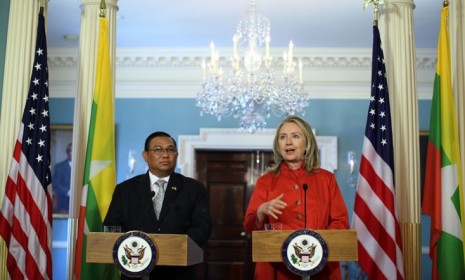The U.S. suspends Myanmar sanctions: Too soon?
The Obama administration rewards the isolated nation's democratic reforms. Will the country's military respond by further opening up — or by backsliding?

A free daily email with the biggest news stories of the day – and the best features from TheWeek.com
You are now subscribed
Your newsletter sign-up was successful
On Thursday, President Obama nominated a new ambassador to Myanmar (formerly known as Burma), renewing diplomatic ties that had been frozen for two decades. The U.S. also suspended some of the sanctions imposed when Myanmar's military began to crack down on the country's political opposition in 1988. The new moves were a response to the swearing in of pro-democracy activist and Nobel Peace Prize laureate Aung San Suu Kyi as a member of parliament, although human rights activists called the American gestures premature, pointing out that the military-dominated government still holds hundreds of political prisoners. Will easing sanctions nudge the country towards democracy, or merely remove the incentive for further reforms?
We shouldn't ease pressure on Myanmar yet: It's too early to reward the government's "untested changes by allowing an unregulated business bonanza," says John Sifton of Human Rights Watch. If we're not careful, Western investment might end up fueling human rights abuses like forced labor, and "strengthening the military's control over civilian authorities."
"US/Burma: Don't lift sanctions too soon"
The Week
Escape your echo chamber. Get the facts behind the news, plus analysis from multiple perspectives.

Sign up for The Week's Free Newsletters
From our morning news briefing to a weekly Good News Newsletter, get the best of The Week delivered directly to your inbox.
From our morning news briefing to a weekly Good News Newsletter, get the best of The Week delivered directly to your inbox.
If anything, we should move faster: The U.S. should be even "more proactive" to encourage further democratic change, Sen. Jim Webb (D-Va.) tells The Christian Science Monitor. The European Union has already lifted all economic sanctions against Myanmar's leaders, with Aung San Suu Kyi's full support. We should follow suit.
"Obama names ambassador to Myanmar: Is US moving too slow or too fast?"
For now, this strikes a good balance: Make no mistake — this is big news, says Emily Lodish at Global Post. U.S. companies will be able to invest in Myanmar for the first time in decades. Still, with the easing of the ban came the renewal of restrictions that still bar Americans from doing business with anyone linked to the military. "The devil is in the details," and the fine print says that Obama still has some bargaining chips to keep the pressure on.
"Big news for Myanmar, but still not the biggest"
A free daily email with the biggest news stories of the day – and the best features from TheWeek.com
-
 Tourangelle-style pork with prunes recipe
Tourangelle-style pork with prunes recipeThe Week Recommends This traditional, rustic dish is a French classic
-
 The Epstein files: glimpses of a deeply disturbing world
The Epstein files: glimpses of a deeply disturbing worldIn the Spotlight Trove of released documents paint a picture of depravity and privilege in which men hold the cards, and women are powerless or peripheral
-
 Jeff Bezos: cutting the legs off The Washington Post
Jeff Bezos: cutting the legs off The Washington PostIn the Spotlight A stalwart of American journalism is a shadow of itself after swingeing cuts by its billionaire owner
-
 The billionaires’ wealth tax: a catastrophe for California?
The billionaires’ wealth tax: a catastrophe for California?Talking Point Peter Thiel and Larry Page preparing to change state residency
-
 Bari Weiss’ ‘60 Minutes’ scandal is about more than one report
Bari Weiss’ ‘60 Minutes’ scandal is about more than one reportIN THE SPOTLIGHT By blocking an approved segment on a controversial prison holding US deportees in El Salvador, the editor-in-chief of CBS News has become the main story
-
 Has Zohran Mamdani shown the Democrats how to win again?
Has Zohran Mamdani shown the Democrats how to win again?Today’s Big Question New York City mayoral election touted as victory for left-wing populists but moderate centrist wins elsewhere present more complex path for Democratic Party
-
 Millions turn out for anti-Trump ‘No Kings’ rallies
Millions turn out for anti-Trump ‘No Kings’ ralliesSpeed Read An estimated 7 million people participated, 2 million more than at the first ‘No Kings’ protest in June
-
 Ghislaine Maxwell: angling for a Trump pardon
Ghislaine Maxwell: angling for a Trump pardonTalking Point Convicted sex trafficker's testimony could shed new light on president's links to Jeffrey Epstein
-
 The last words and final moments of 40 presidents
The last words and final moments of 40 presidentsThe Explainer Some are eloquent quotes worthy of the holders of the highest office in the nation, and others... aren't
-
 The JFK files: the truth at last?
The JFK files: the truth at last?In The Spotlight More than 64,000 previously classified documents relating the 1963 assassination of John F. Kennedy have been released by the Trump administration
-
 'Seriously, not literally': how should the world take Donald Trump?
'Seriously, not literally': how should the world take Donald Trump?Today's big question White House rhetoric and reality look likely to become increasingly blurred